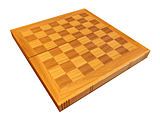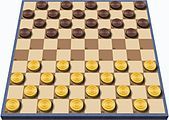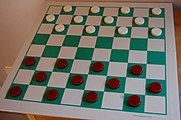Checkerboard

A checkerboard (North American English) or chequerboard (Commonwealth English except Canada; see spelling differences) is a game board of checkered pattern on which checkers (also known as English draughts) is played.[1] Most commonly, it consists of 64 squares (8×8) of alternating dark and light color, typically green and buff (official tournaments), black and red (consumer commercial), or black and white (printed diagrams). An 8×8 checkerboard is used to play many other games, including chess, whereby it is known as a chessboard. Other rectangular square-tiled boards are also often called checkerboards. In The Netherlands, however, a dambord (checker board) has 10 rows and 10 columns for 100 squares in total (see article International draughts).
Games and puzzles using checkerboards
[edit]
Martin Gardner featured puzzles based on checkerboards in his November 1962 Mathematical Games column in Scientific American. A square checkerboard with an alternating pattern is used for games including:
- Amazons
- Chapayev
- Chess and some of its variants (see chessboard)
- Czech draughts
- Draughts, also known as checkers
- Fox games
- Frisian draughts
- Gounki
- International draughts
- Italian draughts
- Lines of Action
- Pool checkers
- Russian checkers
The following games require an 8×8 board and are sometimes played on a chessboard.
Mathematical description
[edit]Given a grid with rows and columns, a function ,
or, alternatively,
The element is black and represents the lower left corner of the board.
Gallery
[edit]-
An empty 8×8 checkerboard
-
An empty 8×8 checkerboard diagram
-
The opening setup of international draughts, which uses a 10×10 checkerboard
-
English draughts tournament standard
See also
[edit]References
[edit]- ^ Weisstein, Eric W. "Checkerboard". mathworld.wolfram.com.










